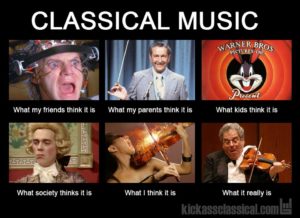 There are many myths and preconceptions surrounding classical music, many of which are either inaccurate or just plain wrong…
There are many myths and preconceptions surrounding classical music, many of which are either inaccurate or just plain wrong…
Classical Music is only for old people
Classical music is for anyone of any age
You have to wear special clothes for concerts/opera
You can wear what you like. Opera festivals like Glyndebourne do have dress codes and attendees enjoy dressing up to go, but in general there is no dress code for concerts or operas. Just wear what is comfortable.
Classical Music is for the rich elite
Classical music is for everyone. Classical concert tickets are considerably cheaper than pop gigs and festivals, or football matches.
You need specialist knowledge to understand/appreciate Classical Music
Just open your ears and experience the sounds. Knowing that a work is constructed in Sonata Form is not necessarily going to enhance your experience. You may find after you’ve heard a piece of music that you would like to find out more about it – concert programme notes can help with this, and there are plenty of resources online to increase your knowledge.
Knowing about the music is the job of the musicians – the audience is there to enjoy it!
“I don’t know anything about classical music”
But you can explain the emotional impact of pieces like The Lark Ascending or the Ride of the Valkyries – which reveals your reaction to the music and therefore proves that you do “know something” about it!
Vaughan Williams: The Lark Ascending
Classical music is “hard”
Classical music – like other music – is about emotions, and those who write the stuff were and are human beings, just like us. Classical music is about the human condition – love, sex, life, death – because composers, like us, have fallen in love, out of love, experienced joy or sorrow…… Sometimes expressing these human varied emotions can result in complex or long music, but let your mind wander as you listen, and the music will set your imagination free.
Classical Music is “relaxing”
Yes, some of it is, and its therapeutic benefits are well known and documented. But a lot of it is uplifting, exciting, energising, thrilling… because it encompasses the full gamut of human emotion (see above)
People who like classical music are snobby/stuffy/high-brow
People who like classical music are just like you and me. Get chatting to others at a concert and you will find that the vast majority of classical music fans are ordinary people who simply enjoy the music.
“I’m worried I might clap at the wrong time”
Multi-movement works like symphonies or sonatas tend to be performed without applause between the movements – a custom which developed at the end of the nineteenth century – but people do applaud between movements, especially at the Proms, and that’s fine!
Classical music was written by dead white men in periwigs
Classical music was, and is, written by men and women, white and BAME people, and many are very much alive and well today.
Only men can conduct classical music
Women can and do conduct too! Marin Alsop, one of the most respected international conductors, is female, and there’s a whole crop of younger women conductors following in her footsteps. Gender shouldn’t come into it – they are all “conductors”, regardless of their sex!
Classical musicians are all highly-strung divas who live in ivory towers. They are not “normal” people
Very few classical musicians today fit that clichéd model. And why? Because they know that being a diva makes you a difficult colleague to work with. Most are very normal, living in ordinary houses, with families, pets, and the same day-to-day concerns (like how to pay the bills) as the rest of us.
“You’re so lucky to be able to do your hobby as a job!” (see also: “What do musicians do all day?”)
Being a classical musician is not a hobby. It is a profession which requires huge commitment, specialist training, and hours and hours of practicing to prepare, maintain and refresh repertoire.
“You’re so talented! It’s amazing how the music magically comes out of your fingers!”
“Talent” is 99% hard graft – and the so-called “magic” the result of hours and hours of deliberate practice. (See above)
“Stockhausen is unlistenable”: All modern/contemporary classical music sounds like “a squeaky gate”
A lot of modern/contemporary music is very melodic, accessible and easy to listen to




